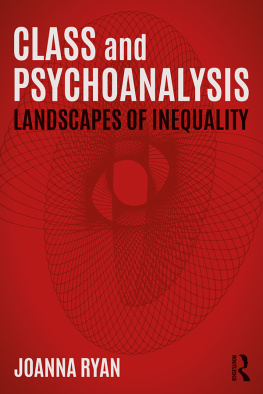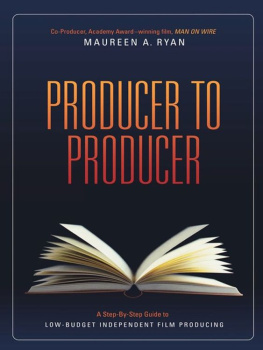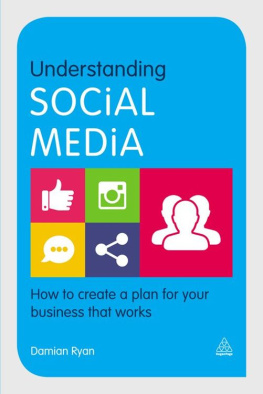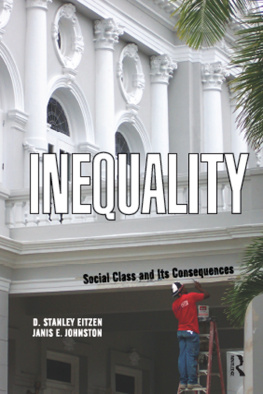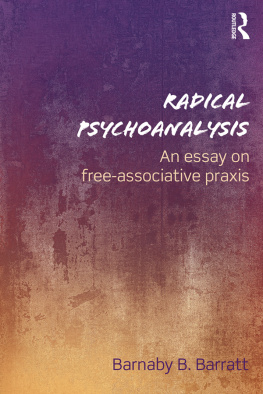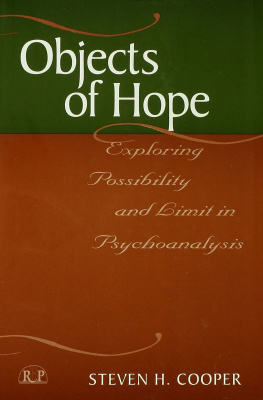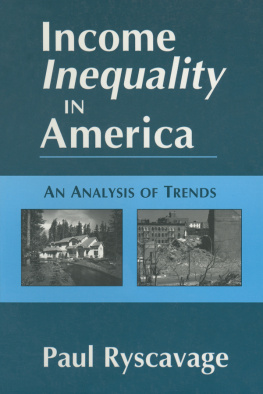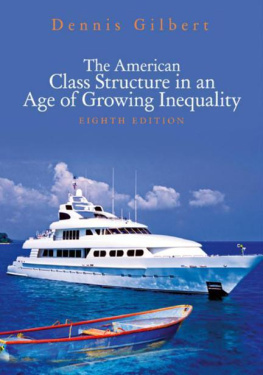Ryan - Psychoanalysis and class: the psychic landscapes of inequality
Here you can read online Ryan - Psychoanalysis and class: the psychic landscapes of inequality full text of the book (entire story) in english for free. Download pdf and epub, get meaning, cover and reviews about this ebook. year: 2017, publisher: Taylor and Francis;Routledge, genre: Politics. Description of the work, (preface) as well as reviews are available. Best literature library LitArk.com created for fans of good reading and offers a wide selection of genres:
Romance novel
Science fiction
Adventure
Detective
Science
History
Home and family
Prose
Art
Politics
Computer
Non-fiction
Religion
Business
Children
Humor
Choose a favorite category and find really read worthwhile books. Enjoy immersion in the world of imagination, feel the emotions of the characters or learn something new for yourself, make an fascinating discovery.
Psychoanalysis and class: the psychic landscapes of inequality: summary, description and annotation
We offer to read an annotation, description, summary or preface (depends on what the author of the book "Psychoanalysis and class: the psychic landscapes of inequality" wrote himself). If you haven't found the necessary information about the book — write in the comments, we will try to find it.
Ryan: author's other books
Who wrote Psychoanalysis and class: the psychic landscapes of inequality? Find out the surname, the name of the author of the book and a list of all author's works by series.
Psychoanalysis and class: the psychic landscapes of inequality — read online for free the complete book (whole text) full work
Below is the text of the book, divided by pages. System saving the place of the last page read, allows you to conveniently read the book "Psychoanalysis and class: the psychic landscapes of inequality" online for free, without having to search again every time where you left off. Put a bookmark, and you can go to the page where you finished reading at any time.
Font size:
Interval:
Bookmark:
First published 2017
by Routledge
2 Park Square, Milton Park, Abingdon, Oxon OX14 4RN
and by Routledge
711 Third Avenue, New York, NY 10017
Routledge is an imprint of the Taylor & Francis Group, an informa business
2017 Joanna Ryan
The right of Joanna Ryan to be identified as author of this work has been asserted by her in accordance with sections 77 and 78 of the Copyright, Designs and Patents Act 1988.
All rights reserved. No part of this book may be reprinted or reproduced or utilised in any form or by any electronic, mechanical, or other means, now known or hereafter invented, including photocopying and recording, or in any information storage or retrieval system, without permission in writing from the publishers.
Trademark notice: Product or corporate names may be trademarks or registered trademarks, and are used only for identification and explanation without intent to infringe.
British Library Cataloguing-in-Publication Data
A catalogue record for this book is available from the British Library
Library of Congress Cataloging-in-Publication Data
A catalog record for this title has been requested
ISBN: 978-1-138-88549-3 (hbk)
ISBN: 978-1-138-88551-6 (pbk)
ISBN: 978-1-315-71540-7 (ebk)
Typeset in Bembo
by Apex CoVantage, LLC

This book has evolved over many years of practice, discussion and engagements of various kinds. I would like to thank the participants in my research study, and all the patients and supervisees whom I have had the privilege to work with. The Tavistock Institute of Medical Psychology funded some of my research. I have benefited greatly from being a Visiting Research Fellow in the Department of Sociology, Goldsmith University of London, in 200408. An Honorary Research Fellowship in 2016 in the Department of Psycho social Studies, Birkbeck, University of London, has helped me complete this book. I have gained much from my involvement with The Site for Contemporary Psychoanalysis and the critical and innovative psychoanalytic thinking that it enables.
Sheila Ernst, who died in 2015, had been a long-term companion in many of these journeys through psychoanalysis and politics, and an inspiring internal presence through the writing of it. I owe much to the stimulation and support of Vic Seidlers friendship, breadth of knowledge and critique over many years. Im hugely grateful to Ruth Petrie for invaluable editorial input into the whole book, and for her consistent and sustaining friendship. Madelyn Brewer has read many chapters and provided thought-provoking comments, as have Sue Einhorn, Marion Gow, Julian Lousada, Allegra Madgwick, Marie Maguire, Janet Sayers and Vic Seidler. My long-standing womens group has been a constant source of support and challenge. Thanks to Marion Gow and Angela Kreeger for initiating a Laplanche study group. Casey Ryan has been invaluable in patiently helping me navigate the IT demands of the twenty-first century, as well as in his support and encouragement. Aaron Brown has been consistently concerned for my work and well-being, as have many other friends and family. Thanks also to Riccardo Steiner for his engagement and encouragement. I am immensely grateful to the NHS, and especially my GP, Dr Sanders, for their essential ministrations over the years. Margaret Mellor has done some essential copy-editing.
Excerpts from Extrusion and disavowal, previously published in Sitegeist: A Journal of Psychoanalysis and Philosophy (2009), are reprinted with kind permission of Karnac Books.
Portions of Class is in you, previously published in British Journal of Psychotherapy (2006), are reprinted with permission from John Wiley and Sons.
Portions of Class is in you in Thinking Space: Promoting Thinking About Race, Culture and Diversity in Psychotherapy and Beyond , edited by Frank Lowe (2013), are reprinted with kind permission of Karnac Books.
Lynne Layton, Laurence Spurling, Penny Crick and Teresa Mulvena have allowed me to quote from unpublished papers.
Class within Therapy Relationships
Here I explore how the dynamics of therapy relationships may be inflected by class, based on my own research and the contemporary writings of others. Dimen argues that class has powerful unconscious resonances such that: The fault lines of class and other hierarchies show up systematically in transference and countertransference (Dimen, 1994: 79). Whitman-Raymond describes how fraught with anxiety the elucidation of class in clinical work can be. She asks: How can clinicians begin to talk about the pain of our class limitations and class exploitation as they are experienced, and at times replicated, in the clinical setting? (Whitman-Raymond, 2009: 440). This chapter provides many diverse examples of how therapists do often do this, within various class permutations, and sometimes fail to do so. I show how different therapists conceptualise and work with class issues, and the barriers to this.
I asked the therapists in my study (Ryan, 2006/2013) to describe in some detail their clinical work with two patients, one working class, and one middle class, as this was perceived by the therapist and/or in accordance with patients self-ascriptions where these were present. They were asked to select cases where they were aware there were class issues, either for their patients or for themselves in relation to these patients, or both. It became apparent that prior preparation for this part of the interview was advantageous, and I sent guidelines to all subsequent interviewees outlining possible topic areas and questions. This is unusual in qualitative research but reflects the reality that to ask therapists to talk in detail about their clinical work does entail thought and preparation. They were asked to provide some general background to their descriptions of their work with each patient, their understandings of class issues for that patient, and any class-related aspects of the transferencecountertransference that they perceived. I would at times ask for more elaboration, or sometimes suggest links to other parts of the interview, if appropriate. The interviews were psychoanalytically informed, in the sense that all parties were experienced in psychoanalytic modes of self-reflection and thinking, and the topic was clinical work.
Most therapists readily located examples of work where they felt class was an issue of some kind. The exception was K, who said of her NHS work: I did obviously have working-class patients there, but I dont think class is what I was thinking about , and I dont think Id have mentioned it in an assessment.
Many of the interviews were highly charged, and it was as if we had embarked on unusual discussions. The therapists accounts were a mixture of what they were felt were class issues for particular patients, and also of how they felt class played out in the interface between the two of them. B asked: Does the social class appear in the transference and how would the analyst hear it? a highly pertinent question that puts the onus as much on the therapist as on the patient. Here I illustrate some class-related transferences and how these therapists heard and responded to them.
In what follows, the data from the interviewees from lower middle-class backgrounds is combined with the data from those from working-class backgrounds, as much of their material, both biographical and professional, contained similar concerns and was distinctively different from that of the middle-class interviewees. This generated four possible pairings of therapist and patient as regards class: two with a class difference and two with a similarity. I did not start out with any assumption about dividing the research material up in this dichotomised way, but the subsequent analysis of the transcripts did suggest that with the two possible pairings with class differences there were distinctive themes, and there was almost no overlap between these. That talk about class can readily default to the binaries of working class and middle class, the haves and have-nots, or us and them, indicates the intensity of emotion and projection at play and the powerfulness of social divisions and inequality, even if this does not always correspond to more complex or differentiated realities. Class issues of many different kinds were reported in all combinations. Here I have selected some detailed accounts and described others more briefly.
Next pageFont size:
Interval:
Bookmark:
Similar books «Psychoanalysis and class: the psychic landscapes of inequality»
Look at similar books to Psychoanalysis and class: the psychic landscapes of inequality. We have selected literature similar in name and meaning in the hope of providing readers with more options to find new, interesting, not yet read works.
Discussion, reviews of the book Psychoanalysis and class: the psychic landscapes of inequality and just readers' own opinions. Leave your comments, write what you think about the work, its meaning or the main characters. Specify what exactly you liked and what you didn't like, and why you think so.

